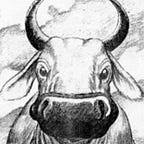Antigua and Barbuda — Lucy
Jamaica Kincaid’s wonderful book is not for me, in the best possible way
Lucy came highly recommended, and I leapt at the chance because I’d heard good things about Kincaid, who I had never read, and because I wanted to break the long line of male authors I’d had recently. In retrospect maybe I should have done a little more research. I might have ended up reading Kincaid’s A Small Place, which is more Antiguan (although Antigua does feature in Lucy in a number of ways), or Unburnable by Marie-Elena John which is more current (Lucy came out in 1990), and sounds fascinating. But I am not at all sorry to have read it.
Lucy blurs the line between (bildungs)roman-à-clef and straight autobiography (literally: the protagonist is called Lucy Elaine Potter, Jamaica Kincaid was born Elaine Cynthia Potter Richardson). It tells the story of a nineteen year old au pair from Antigua’s first year in New York City.
It’s a short novella that I had to read quite slowly for reasons largely unconnected to the book, and that made it quite hard to get into. Even once hooked initially I could admire the artistry of the prose (it is absolutely beautifully written) but found it quite challenging to engage beyond that. This is a story about what it feels like to be a teenage woman and what it feels like to be black and West Indian in New York; and it is not a story about explaining how it feels for the benefit of white men. In a world where a hugely disproportionate amount of media is written to pander to me or to people like me, and where one has to actively seek out much of what else remains, reading this book felt oddly like intruding somewhere that I hadn’t been invited.
But that feeling was temporary. This book is irresistible: it drags you along with it despite its lack of compromise, and while it would be exceptionally crass to suggest that I have learned anything at all about being a black nineteen year old woman, I can say that the book gave me an enjoyable, informative, and empathetic time slightly outside my comfort zone. This was of course the entire point of this exercise, and it’s noteworthy looking back how many of the other books I’ve read so far in this project were well inside that comfort zone, regardless of location, whereas this book — set in New York — was the first to make me feel like I was experiencing something genuinely new (then again I’ve visited some 30–40 countries around the world and the only place that has ever felt entirely alien to me is NYC).
The book is particularly good on colonial legacies. Writing about The Meursault Investigation I said that the problem with anger is it gets a little dull because you don’t learn anything from it beyond the fact that a person is angry. Kincaid shows that isn’t true, and that anger can be highly articulate. There’s a kind of relentlessness to Lucy — the person and the book — and in that relentlessness you gain an understanding of the mechanisms and directions in which those forms of anger will drive a person.
Not much happens in this book in terms of plot: she au pairs for a bit, that’s it. You do not find out what happens next (the real life Jamaica Kincaid au paired her way through community college, then into a university scholarship, then writing for teen magazines, then for the New Yorker, and ultimately novels and became — in my current favourite piece of literary trivia — Vizzini’s sister-in-law). But this isn’t a plot book. You see Lucy develop a little — becoming less whimsical and more conventional — but mostly she remains defiantly unchanged.
So what is it? What does it say and what does it teach you? Well cop out as this may be I think I have to say: frankly a lot of things — almost as many as there are words in the book and many more between its lines — and most of them are for Kincaid to say rather than for me to put words in her mouth. But reading Lucy is time well spent for anyone, perhaps particularly for the people it is not written for.
